
Coronidium elatum, commonly known as the white paper daisy or tall everlasting, is a perennial herbaceous shrub in the family Asteraceae found in open forests in eastern Australia. A woody shrub 0.6 to 2 m tall, it has white flowers which appear in spring. It was known as Helichrysum elatum for many years until it was finally reviewed in 2008.
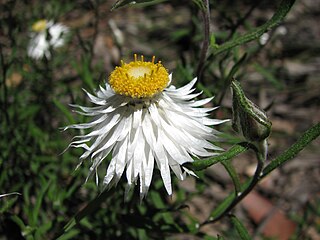
Helichrysum leucopsideum, commonly known as satin everlasting, is a flowering, perennial herb in the family Asteraceae. It is grows in all states of Australia except Queensland and the Northern Territory. It has white, terminal flower heads and narrow, woolly leaves.
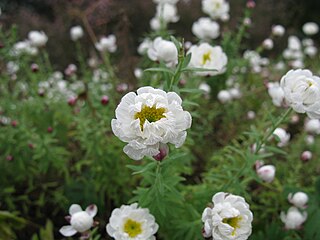
Rhodanthe anthemoides, commonly known as chamomile sunray, is a flowering plant in the family Asteraceae. It is a small, perennial shrub with greyish-green leaves, white papery flowers, yellow centre and is endemic to Australia.
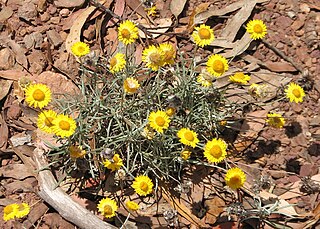
Leucochrysum albicans, commonly known as hoary sunray, is a flowering plant in the family Asteraceae. It is a small perennial with grey leaves, white or yellow flower-heads and is endemic to Australia.

Actites, commonly known as the dune thistle, beach thistle or coastal sow thistle, is a genus of flowering plants in the family Asteraceae. It is endemic to Australia and contains only one species, Actites megalocarpa. It is a large, clumping herb with yellow flowers.

Helichrysum splendidum is a species of flowering plant in the family Asteraceae, found in Africa and Yemen A hardy evergreen perennial, it occurs from the Southern Cape to Ethiopia along the eastern escarpment mountains, favouring rocky places in fynbos, grassland and savanna biomes. It forms mound-shaped aggregations 1–2 meters high, sometimes covering entire hillsides. The species is found in South Africa, Eswatini, Lesotho, Tanzania, Ethiopia, South Sudan, Malawi, Zimbabwe, Zambia and Yemen. The distribution of this species is clearly anthropogenic, that is, closely linked to the movements of man through the ages.

Diplolaena mollis is a species of flowering plant in the family Rutaceae and is endemic to the west coast of Western Australia. It has broadly elliptic or egg-shaped, leathery leaves that are densely covered in hairs and reddish, pendulous flowers.
Diplolaena cinerea, is a species of flowering plant in the family Rutaceae and is endemic to the west coast of Western Australia. It has pale orange flowers, papery, elliptic shaped leaves that are covered in star-shaped hairs on the upper surface.
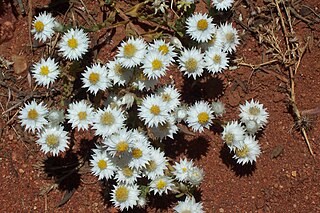
Rhodanthe floribunda, commonly known as common white sunray, is a flowering, herbaceous plant in the family Asteraceae. It is a small, upright or decumbent plant with white flowers, yellow florets and is endemic to Australia.

Symphyotrichum molle is a species of flowering plant in the aster family (Asteraceae) endemic to the Bighorn Mountains of Montana and Wyoming in the United States. Commonly known as soft aster, it is a perennial, herbaceous plant that ranges from 30 to 60 centimeters in height.

Lasiopetalum molle, commonly known as soft leaved lasiopetalum, is a species of flowering plant in the family Malvaceae and is endemic to the south-west of Western Australia. It is an erect or spreading subshrub or shrub with hairy stems, thick and stiff egg-shaped leaves and pink flowers.

Coronidium rupicola, commonly known as the yellow button, is a flowering plant in the family Asteraceae. It is a small, upright, perennial shrub with yellow flowers borne on a single stem and is endemic to Queensland, Australia.

Argentipallium obtusifolium, commonly known as blunt everlasting, is a species of flowering plant in the family Asteraceae. It is a small, multi-stemmed perennial with white flowers, dark green leaves and is endemic to Australia.

Rhodanthe chlorocephala commonly known as pink and white everlasting, is a flowering plant in the family Asteraceae. It is a small, tufted plant with blue-green leaves, white, pink or yellow flowers and grows in Western Australia and South Australia.

Rhodanthe humboltiana, commonly known as the golden cluster everlasting, is a flowering annual in the family Asteraceae. It is a small, upright, branching plant with yellow flowers, and is endemic to Western Australia.

Hyalosperma praecox commonly known as fine-leaf sunray, is a flowering plant in the family Asteraceae. It is an upright, annual herb with stems branching from the base and yellow or white flowers and grows in New South Wales and Victoria.

Hyalosperma demissum, commonly known as moss sunray, is a flowering plant in the family Asteraceae. It is a small, annual herb with whitish yellow flowers and is endemic to Australia.
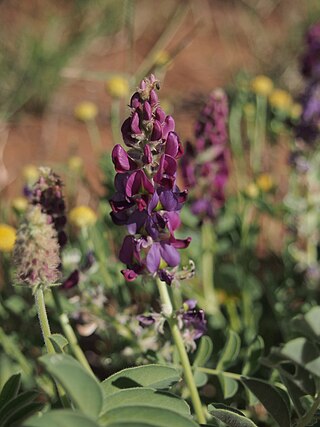
Swainsona canescens, commonly known as grey swainsona, is a flowering plant in the family Fabaceae. It is a small perennial herb with pink-purple or purple, yellow and green flowers and grows in Queensland, Western Australia and South Australia.

Podolepis hieracioides commonly known as long podolepis, is a flowering plant in the family Asteraceae and grows in New South Wales and Victoria. It is a small perennial with yellow flowers.

Argentipallium blandowskianum, the woolly everlasting, is a species of flowering plant in the family Asteraceae.



















